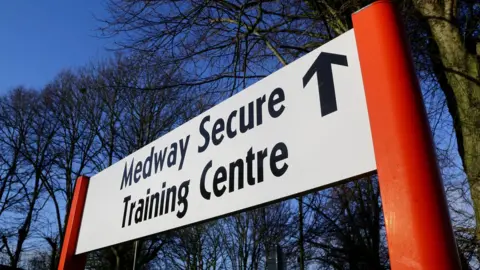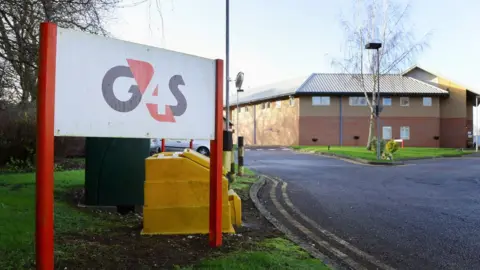G4S Medway report: Painful restraint of children challenged
 PA
PAPainful restraint of children in young offenders institutions and secure training centres increases the risk of abuse, a serious case review has said.
The restraint techniques are authorised in certain situations, but a BBC Panorama programme in 2016 showed mistreatment at a centre in Kent.
G4S recruited staff with no experience of working with children, said the review.
Sixteen people were later arrested. There were no convictions.
G4S held the contract to run the Medway Secure Training Centre, Rochester, from 1998 to 2016, at which point the government took over.
'Highly unpleasant'
The serious case review (SCR) said the use of restraint techniques, that "include a final stage allowing infliction of pain on children", featured strongly in the Panorama programme and "appeared to enable an environment of increased risk of abuse to children".
"Children reported that having pain inflicted on them was a highly unpleasant experience," the report said.
The case review recommended a Ministry of Justice (MoJ) review of the authorisation of pain-inducing restraint on children detained in young offenders institutions and secure training centres considers alternative techniques used in secure children's homes.
It points out that restraint involving pain is not used at those homes, even though they house "equally challenging" children.
The report said Her Majesty's Inspector of Prisons had made previous recommendations to the MoJ that the use of pain-inflicting techniques on children in secure training centres (STCs) and young offenders institutions should be stopped.
Justice minister Edward Argar told the House of Commons in September: "The government has committed to review the use of pain-inducing techniques in systems of restraint used on those under the age of 18 years in custodial and escort situations.
"We are finalising the scope and timetable for the review, which we expect to be agreed shortly."
Whistle blowing
The 65-page report states that "staff were recruited to the STC without previous experience of working with children, or with the necessary behaviours, values and attitudes".
G4S's report to the review said some staff had never worked with young people before, but all those subject to the allegations had undertaken relevant training.
There was also an operational whistle-blowing policy in place and a culture "of openness and honesty", it said.

Analysis
Danny Shaw, BBC home affairs correspondent
The most worrying aspect of this detailed review is that the many organisations involved at Medway simply hadn't identified or addressed the problems which Panorama highlighted.
Reports of crimes committed against children were "stymied", there were "serious deficiencies" in the way the local authority handled allegations; safeguarding officials failed to analyse complaints properly.
In short, the voices of young people detained at Medway went unheard.
Ultimately, of course, responsibility for the failings rested with G4S, which managed the centre: the company paid the price through the loss of its contract.
But everyone in this sector - including children's charities, police officers and watchdogs - should read this report because there are lessons for all of them.

The review said improvements had been made at the Medway training centre, but it made 38 recommendations.
These including listening more to children and whistleblowers, improving training, and improving how the Ministry of Justice monitors its contracts.
 PA
PAMedway Council also came in for criticism, with the department responsible for managing allegations of abuse against people who work with children described as having acted in an "erratic and ineffective" manner.
However, the SCR report said there appeared to be "a good understanding of the duties by all" at Medway Children's Social Care, and the direct work by the Medway Youth Offending Team with the children was "of a high standard".
The SCR report concluded: "Had a number of arrangements been more effective there were opportunities to prevent the abuse of children.
"Local and national agencies and the multi-agency processes to monitor the STC were not effective in identifying and responding and monitoring allegations of abuse meant children were not kept safe."
John Drew, independent chairman of the Medway Safeguarding Children Board, which published the serious case review's findings, said it was "clear there were many lessons to be learnt by a number of agencies".
Jerry Petherick, managing director of G4S Custodial and Detention Services, described the behaviour of some staff at the centre in 2016 as "completely unacceptable, and in stark contrast to our training and values".
"I am confident that we are an organisation that learns and improves," he said.
'Working tirelessly'
A spokesman for the MoJ said: "We have made significant changes at Medway and across the wider estate since these allegations of abuse were brought to light.
"Medway's last inspection report showed some improvement to safety and we will continue working tirelessly to raise its standards."
Ian Sutherland, director of children and adult services at Medway Council, said: "We fully accept the recommendations in the serious case review and will be addressing these as a matter of priority.
"Substantial changes have already been made to the local authority designated officer service and these changes, which were made in 2017, addressed many of the points raised following external inspection and reviews."
The Crown Prosecution Service (CPS) decided to prosecute nine people in connection with behaviour towards children in the centre.
Offences included misconduct in public office and common assault.
All nine pleaded not guilty. Following trials, juries found seven of the defendants not guilty. Verdicts were not reached on the remaining two cases and the CPS said a retrial would "not be appropriate".
